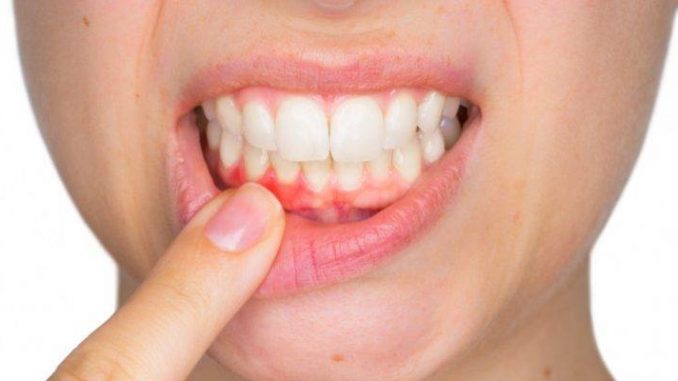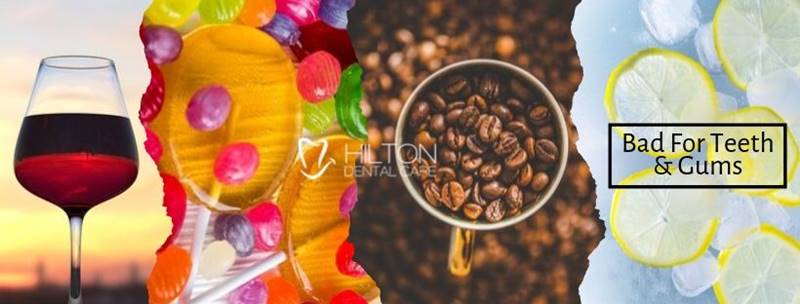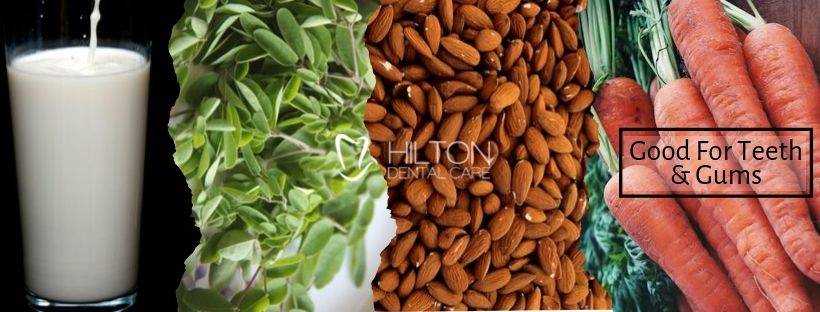
Hippocrates, the Greek doctor and founder of Western medical ethics, once said, “Let food be thy medicine and medicine be thy food.” This quote is particularly accurate when examining dental health and gum disease.
While eating sour candy every once in a while, is highly unlikely to lead to any lasting health ramifications, the foods we eat daily and habitually can impact our oral health. Let’s examine the nutrition of healthy gums and look at some of the best and worst foods you can eat for lasting gum health.
Nutrients that fight gum disease
Gum disease can be a debilitating and excruciatingly painful disease. Plaque build-up can accumulate into tartar, which then causes tooth decay and gum inflammation, or gingivitis. Gingivitis, if left untreated for long enough, can advance into periodontal disease, which is the deterioration and destruction of the gums and the supporting bone and tissue structure. If you’re dealing with gum disease, a dentist near Derby can provide you with much-needed assistance.
Fortunately, a well-balanced diet can help you prevent gum disease, and an ounce of prevention is certainly worth a pound of cure in this situation. Here some of your biggest dietary allies in fighting gum disease:
- Vitamin C
- Helps boost your immune system, regenerate your gums, and facilitate collagen maturation which helps to keep your soft tissues and ligaments in your gums healthy. Cauliflower, green peppers, potatoes, tomatoes and squash are excellent sources of Vitamin C.
- Collagen
- Helps to reorganise oral tissue make-up and promote tissue and oral collagen regeneration. Fish, red vegetables, dark green vegetables, berries, garlic and beans are examples of foods that boost collagen production for healthy gums.
- Catechins
- These disease-fighting antioxidants and phenols help to prevent the growth of harmful bacteria that leads to gum disease and can be found in legumes, dark chocolate, berries and red table wine.
- Co-enzyme Q10, or CoQ10
- CoQ10 is an antioxidant that promotes cellular regeneration and proper cell function. This powerful antioxidant can inhibit periodontal inflammation and is found in fatty fish, oranges, strawberries, chicken, lentils and broccoli.
- Omega-3s
- These fatty acids are found in fatty fish and are renowned for anti-inflammatory and immune-boosting properties.
- Beta-carotene
- Beta-carotene is the precursor of Vitamin A, which is highly anti-inflammatory. Additionally, beta-carotene helps to facilitate gum disease healing, so go ahead and enjoy your carrots and sweet potatoes!
Worst food

Make an effort to avoid these foods in excess, especially when you know it will be hours before you can brush your teeth. Those hours give the sugars and acids time to build upon your teeth and inflict damage. If you do eat these foods, do so in moderation and try to brush your teeth shortly afterward.
1. Sour candies
The sugar combined with the length of time many sour candies take to dissolve in the mouth makes sour candies bad for your teeth.
2. Bread
The starches from simple carbohydrates in many white and processed types of bread can be as bad for your teeth as candy because the bread can get trapped in crevices in your teeth and erode your tooth enamel leading to tooth decay and gum disease.
3. Alcohol
Alcohol can leave you with dry mouth and an inability to wash away plaque and food debris.
4. Ice
Chewing on ice produces wear and tear on the teeth, grating on the enamel and leaving your teeth more susceptible to damage. A chipped or fractured tooth allows bacteria to enter the tooth, and the infection can spread to the gums.
5. Citrus fruits
While vitamin C is great for your smile, citrus fruits are highly acidic. This acid can wear down the enamel of your teeth. Store-bought orange juice is fortified with teeth-loving vitamin D and calcium, making it a better option.
6. Potato chips
Potato chips are packed with starch. When starch is trapped between your teeth, it breaks down into sugar, thereby facilitating the growth of plaque and tartar.
7. Sticky fruits
Sticky fruits are challenging to remove because they can get trapped in the crevices of your teeth.
8. Tea and coffee
Coffee and have high levels of tannins and provide an acidic environment for microbes to thrive and build the sticky plaque that irritates your gums.
Best food

Here are some of the most beneficial foods for your teeth. These are foods that help clean your teeth, are packed with nutrients, or generally facilitate gum health!
1. Cheese
Not only does cheese contain calcium, a significant player in bone and teeth health, but it also contains caseins. Caseins help stabilise and repair tooth enamel.
2. Yogurt
Like cheese, yogurt contains calcium and casein. This helps to keep your teeth and gums at their best. Yogurt also contains probiotics which help to crowd out the bad bacteria that can cause cavities.
3. Green veggies
Leafy greens are packed with minerals and vitamins, including calcium, and folic acid.
4. Apples
Apples have a high fibre and water content. The texture of the fruit helps to clean your teeth and gums. Eating an apple also stimulates saliva production, which helps to wash away debris and repair enamel. If you don’t have access to a toothbrush, eating an apple is a good way to give your teeth a quick clean until you have the time to brush them later in the day.
5. Carrots
Like apples, the texture of carrots helps to clean your teeth and stimulate saliva production. Additionally, carrots are packed with fibre and vitamin A, making them beneficial to gum health.
6. Almonds
Almonds are low in sugar, but high in protein and calcium. This helps to keep your teeth strong.
7. Celery
Celery acts like nature’s toothbrush: its texture helps to scrape food debris and bacteria away from the surface of your teeth. Its high water content and high fibre content benefit your smile, while vitamin C and vitamin A help to facilitate immunity, gum health and repair.
8. Water
Water helps to wash away debris, sugar, bacteria and even plaque, rinsing your teeth and helping your saliva to do the job of repairing tooth enamel. Additionally, most tap water contains fluoride, which helps to fight against tooth decay and gum disease.
Conclusion
Remember, if you’re concerned about gum health, maintaining good dental hygiene is essential. Brushing, flossing, and rinsing your mouth as your dentist directs is incredibly important, as is keeping up with regular dental check-ups.
While you don’t have to avoid sour candies and tea, it is a good idea to minimise the foods that produce a lot of wear and tear on your teeth and gums. Instead, make a habit of choosing options that will help your teeth and gums, rather than facilitating their decay. With good health habits and the advice of your dentist, you stand a better chance of having a healthy, happy smile that lasts you a lifetime.
Author’s bio
Principal Dentist in Hilton Dental Care, Dr. Jatinder Dhadli is a BDA member with a special interest in restorative and cosmetic dentistry. Dental practice is conveniently close to both Derby and Burton upon Trent, and offers routine check-ups to advanced and emergency dental care all under one roof.

Leave a Reply